Carlos Acosta: Refashioning ballet with socially distanced tutus
- Published
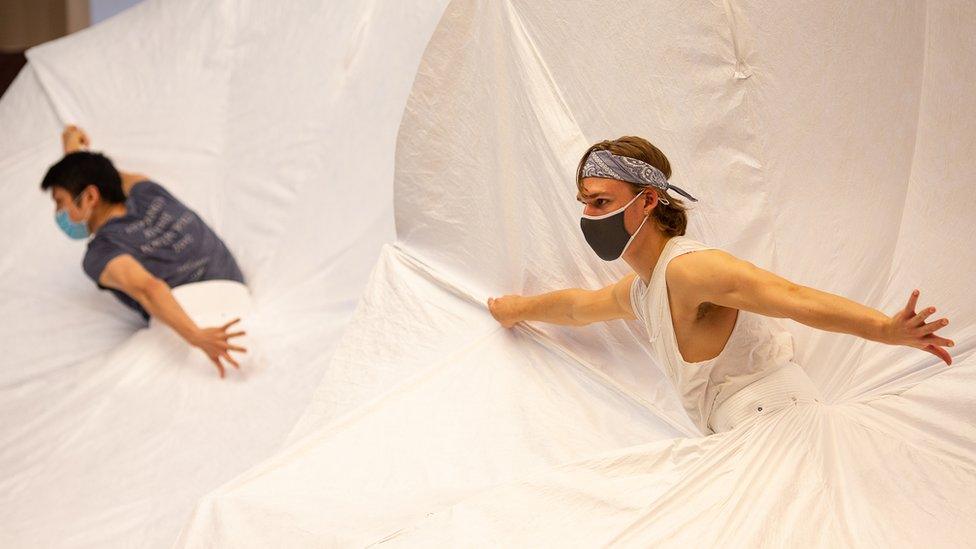
Birmingham Royal Ballet dancers rehearsing amidst their lavish set and costumes
Acclaimed Cuban ballet star Carlos Acosta says "it feels great" to be venturing back to staging indoor performances for a live audience in the UK after months of being prohibited from doing so because of the pandemic.
"It feels great because we've been in lockdown for far too long and it's a kind of career where if you don't exercise your body for a week you go back and pay for it," says Acosta, who is now the director of the Birmingham Royal Ballet.
"We were given Zoom classes at home but it doesn't stress your body to the level you want because you can't jump and use the space, so it's great to be back in the studio."
Acosta and the Birmingham Royal Ballet are following in the footsteps of The Royal Ballet in London which recently performed in front of a live audience in a reduced capacity auditorium, external.
But Acosta is going one step further by introducing socially distanced costumes in the form of extra wide tutus for the brand-new mixed bill Lazuli Sky.
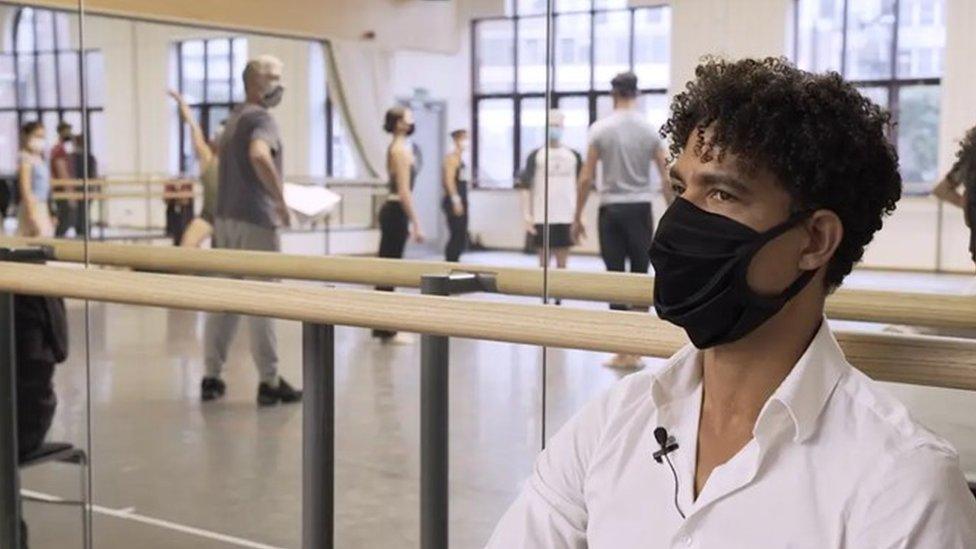
Carlos Acosta watches on as his dancers rehearse
It is the first one-act ballet commissioned and presented by Acosta since he took over as director of the Birmingham company at the start of the year. It is also due to be performed at Sadler's Wells in London at the end of the month.
"When we started, we wanted a piece where nobody would touch each other and so the dancers will be wearing elongated structures that are not static but are constantly moving and creating different shapes, evoking your imagination," explains Acosta about the spiral-shaped costumes.
As the production evolved, the company found a way of forming work bubbles to protect themselves from the virus so now some of the dancers can touch each other, but they decided to keep the costumes to reflect the realities of the pandemic.
"They're great in terms of aesthetic and a record of the time that we live in," Acosta adds.

Artwork for the show denotes the clear blue sky of the title
He has devised Lazuli Sky with the help of his designer Samuel Wyer and the award-winning choreographer Will Tuckett.
The influence for their costumes came from the crinoline skirts worn by fashionable women in the 19th Century to protect themselves from smallpox, cholera - and unwanted male advances.
They are also a nod to "pannier dresses", where an undergarment was made of wide hoops to extend the skirt sideways, and to France's Louis the XIV, known as the "Sun King", who was a ballet enthusiast.
"He had big costumes in his court, and I guess the tutu has always been a socially distanced piece of clothing; a stiff skirt that sticks out half a metre from your body. So it's taking that idea and going 'let's just push it a little bit further'," says Tuckett.
"The movement is dictated by them and the dancers have been fantastically adaptive and collaborative. Both male and female dancers wear them and so far there have been no upsets."
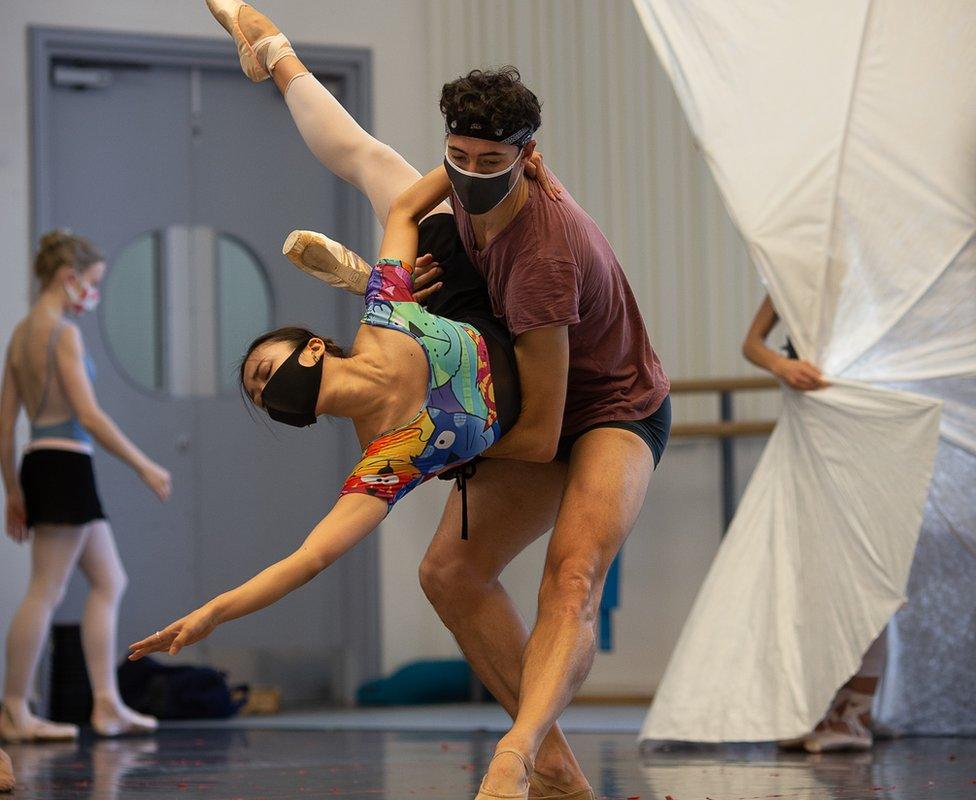
The dancers are able to touch due to the precautions taken
From voluminous gowns gracing the catwalk, to puffball skirts being back in vogue, socially distanced fashion seems to be having a moment and is now gliding into the dance world.
The Dutch National Ballet has been making large tutus from denim, and in Tuckett's production the tutus with 2m trains will also act as part of the set, as the production crew are unable to move props during performances due to the risks of the virus.
"We'll be projecting images onto the skirts," says Tuckett, "and when the dancers come out on stage it's hypnotic and other worldly. They also look like sails and flowers when they all open out, they completely fill the space."
Nature is at the heart of Lazuli Sky, which stands for "bright blue sky" and focuses on the upsides of the pandemic, such as open skies and birdsong, rather than the downsides. It's also an apt title for Acosta personally as he spent lockdown with his family in "gorgeous" Somerset in south west England.
"It's incredible, there were no planes flying, levels of contamination and pollution dropped, and I got to see the beauty of it all," says Acosta.
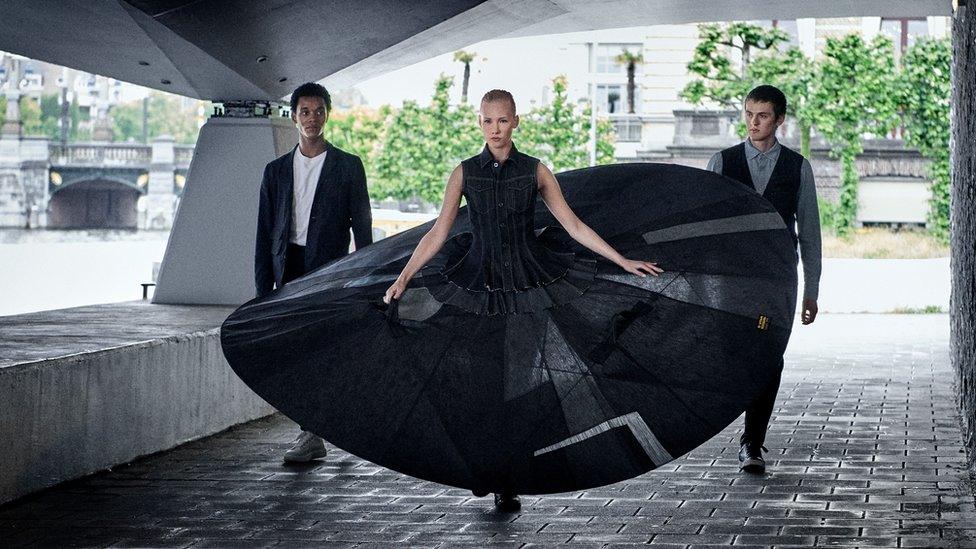
The Dutch National Ballet have used wide denim tutus
"I just hope that people will take notice of this and try and find a solution to help the planet. We want to give people hope."
Returning to Birmingham hasn't been easy. He has personally taken a pay cut to keep all 60 of his dancers employed, and along with forming the work bubbles, Acosta feels any sacrifice is worth it if some of the dancers can now touch on stage.
"It's unnatural for human beings not to touch and we have this tribal aspect of who we are to be social beings and our art form has always been about interaction physically," he says.
"If you take that away from us, I'm not sure what kind of art form you would get if you're not able to do Sleeping Beauty touching each other.
"But we will wear masks on stage if we have to, and the dancers and musicians are very disciplined, we take ourselves very seriously in that regard."
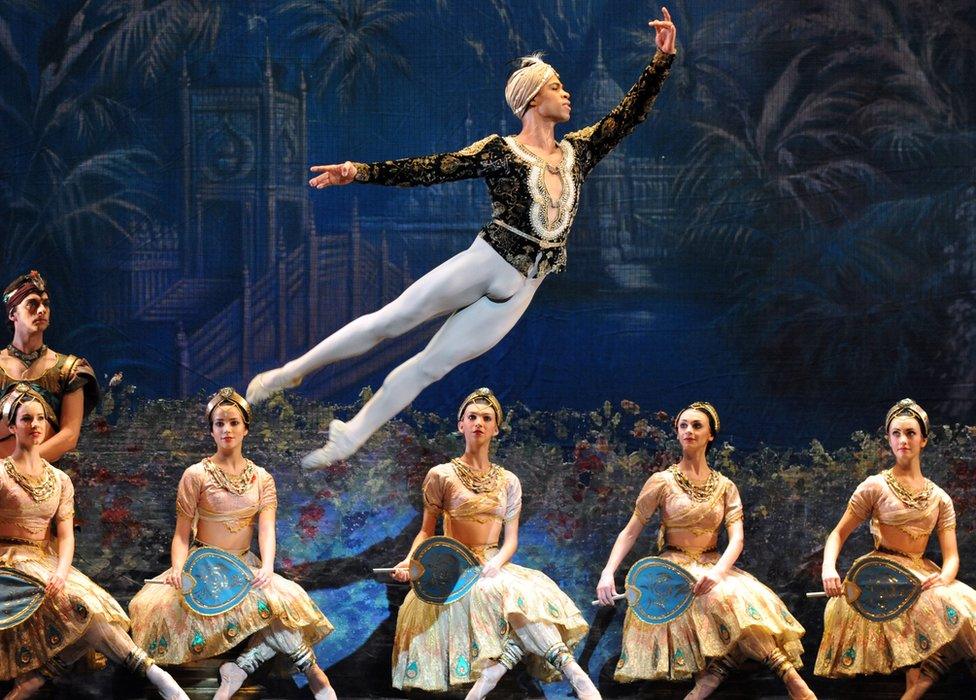
Carlos Acosta performing when he was with London's Royal Ballet
Although Acosta thinks the government's £257 million arts survival fund, external is tremendously "helpful" he feels the dance world has been somewhat overlooked.
He wishes there were more trust and support in what they are doing, particularly when Lazuli Sky sold out in just a couple of hours.
He is now looking to deliver their annual Nutcracker at the Royal Albert Hall in London for Christmas and thinking about a UK tour of Cinderella in the spring.
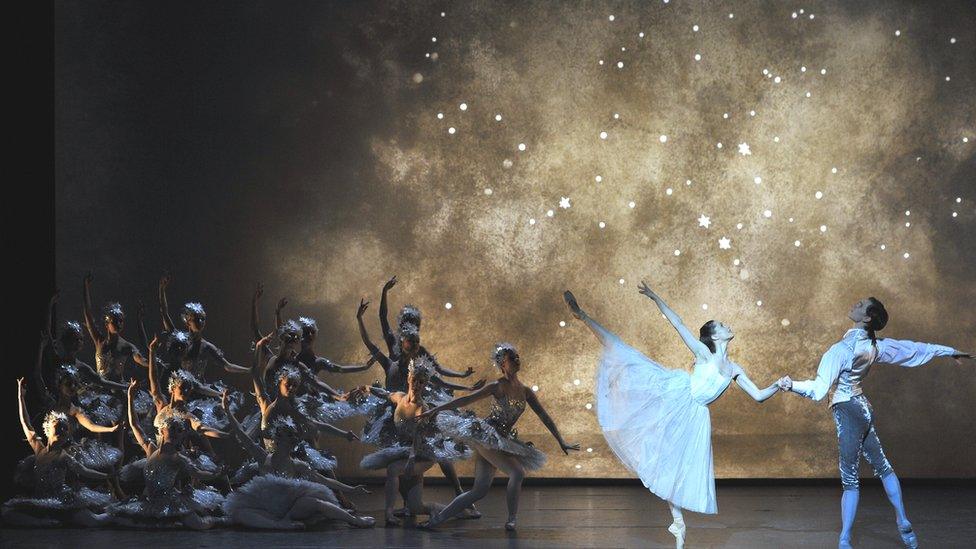
The Birmingham Royal Ballet hope to tour Cinderella in the spring
He is also undeterred by Russia's Mariinsky Ballet's recent attempts at performing in front of live audiences and then having to close when 30 dancers tested positive for Covid-19.
So, is he the man to champion bringing ballet back during the pandemic, particularly having overcome his own challenges growing up in Cuba?
"Well yeah, I just want for the people, especially those in Birmingham, to try and break the stigma that ballet is yesterday and something distant," he says.
"My story, everybody has heard it and what ballet has done for me, and I want to bring that same enthusiasm to everybody, challenge people's perceptions and do the best I can to achieve diversity and a healthy turnout of audiences from different backgrounds."
Yet when it comes to mitigating the risks of Covid-19 Acosta hopes some of his new measures will be short-lived.
"I honestly pray that this thing doesn't continue because we can only afford to reinvent ourselves to a point, and yes, we can look at other performing spaces like warehouses, I'm up for that, and online is positive but the socially distanced aspect of it financially is not going to be viable.
"So, I hope we can live with the virus and keep performing. Some people will stay at home and some people will want to come, and that gives us oxygen."
Lazuli Sky is at the Birmingham Repertory Theatre from 22-24 October then at Sadler's Wells, London from 29-31 October and online from the 1 November.
- Published9 October 2020
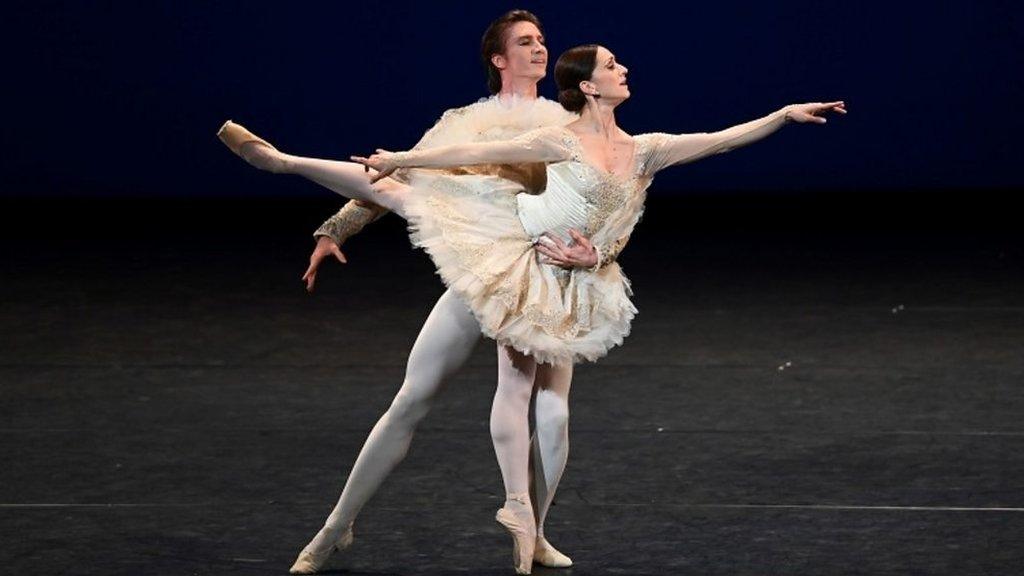
- Published19 June 2020

- Published17 September 2020
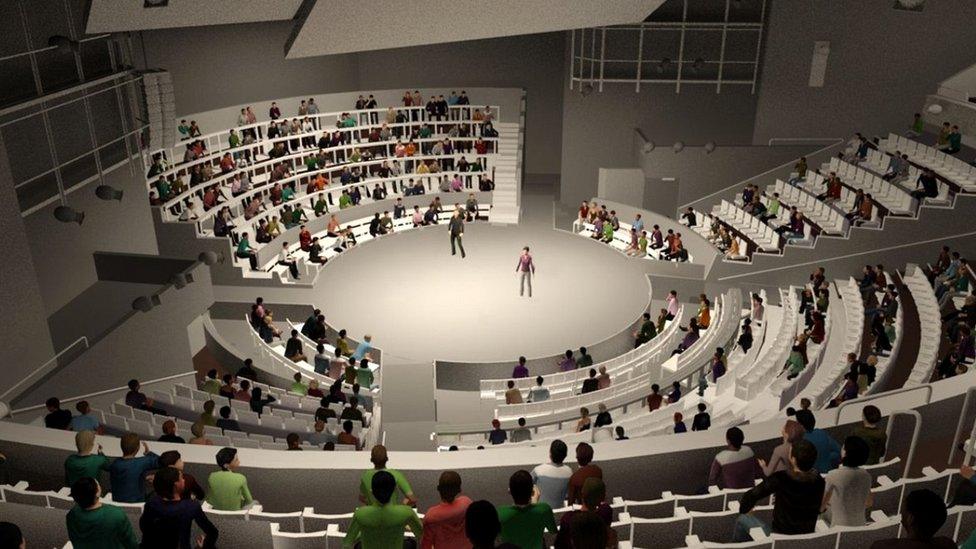
- Published16 October 2020
